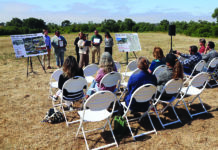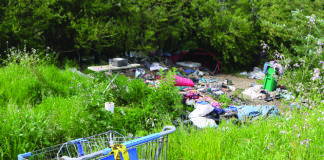
Members of the California Department of Pesticide Regulation presented a plan Monday that aims to strengthen the way the state regulates agricultural pesticides.
The seven-page Draft Strategic Plan 2024-28 was presented in Watsonville to a crowd of about 50 people at the Ramsay Park Family Center.
If approved after a community review process, the plan would deal with safe pest management and regulating pesticides with an emphasis on scientific review processes. It also touched on being transparent to the public with a mission of “protecting human health and the environment.”
Karen Morrison, DPR’s Chief Deputy Director, spelled out the plan with the aid of a projector screen.
“The strategic plan recognizes that pesticide management practices and decisions have broad impacts on human health, social equity, the environment and the economy,” she said. “We also know that the way pesticide management is performed can influence outcomes for all Californians.”
The entire plan can be seen at bit.ly/3MqB9U7.
About 40 people from Watsonville, Salinas, Gonzales and as far away as Santa Maria and Ventura took turns at the open mic to voice concerns and doubts about the plan in two-minute slots allowed to each of them.
One person questioned the timing of the meeting—4pm Monday—when many farmworkers are heading home to clean up for dinner and wouldn’t be able to attend.
Victor Torres, 17, addressed environmental and racial justice, saying he was exposed to pesticides at a young age and had to be rushed to the hospital.
“Many of those pesticides that were applied that day that caused my asthma attack are still on the market and are used throughout the state,” he said. “I am here today not only to protest this complaint brought forward by the authority meant to protect us from such dangerous chemicals, but to also advocate for other members of my community that couldn’t be here today. and for my grandparents who worked in the fields for many years. We have grown tired of the falsehoods brought forward time and time again, enough is enough. Stop prioritizing profits over people’s lives.”
Woody Rehanek of Watsonville, a former farmer, said in the Pajaro Valley Unified School District, 67 farms, greenhouses and nurseries are within a quarter-mile of schools.
“Sixteen growers are organic; 50 growers are conventional chemical,” he said. “Conventional berry farms within a quarter-mile of schools use the carcinogenic fumigant 1,3-D, which has been banned in 34 countries. Does this make sense?”
He stressed that while California boasts the strictest pesticide regulations in the world, it allows 133 chemicals that the European Union has either banned or not registered for use at all.
“The European Union just voted to eliminate 50% of all pesticides by 2030, and 65% of restricted pesticides by that date,” he said. “California needs to follow this lead while converting to organic, regenerative agriculture. In light of this, does the Draft Strategic Plan make sense? Instead, DPR proposes eliminating 50% of restricted pesticides by 2050.”
After reading the Strategic Plan, retired certified organic farmer of 30 years, Tom Willey said, “I don’t know why there is no recognition or even encouragement for the adoption of organic production.”
He pointed out that there are around two million certified organic acres in the state and that such farming practices largely eliminates all toxic inputs into production systems, “and if that is seemingly your ultimate goal, I can’t figure out why you’re not willing to encourage the adoption of certified organic farming.”
Watsonville resident and former PVUSD middle school teacher, Sarah Ringler, addressed strawberry production: “Getting rid of pesticides saves lives in the fields but it also saves lives of consumers—so why does the United States do such a poor job of protecting its consumers?












